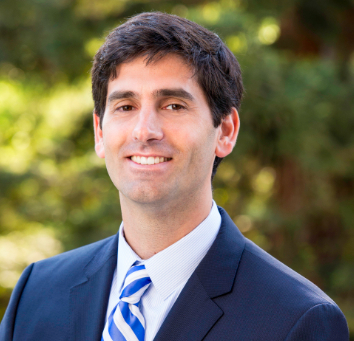
Presented by: Dan Eisenberg, MD, Professor of Surgery (General Surgery), Stanford University
Talk Title: “Obesity in Veterans with Spinal Cord Injury – A work in progress”
Bio: I am a fellowship-trained minimally invasive and bariatric surgeon, who is involved in national surgical and specialty societies. My area of clinical and research interest is in outcomes of metabolic and bariatric surgery in special populations. As a surgeon at the Palo Alto Veterans Hospital, I am specifically interested in the outcomes of weight loss surgery in obese Veterans, who represent a population with a significant burden of co-morbidity, as well as challenging social, economic, and geographic circumstances. In addition, I am currently studying Veterans with spinal cord injury, with a goal to identify gaps in assessment and management of obesity in this special population.
For inquiries, please contact Ana Mezynski at mezynski@stanford.edu
Presented by: Todd Wagner, PhD, Professor of Surgery
Talk title: “The Changing Face of Veterans and Implications for Policy: Insurance Coverage for US Veterans from 2010-2021”
Bio: Todd Wagner is a Professor in the Department of Surgery at Stanford University. He studies health information, efficiency and value, and health care access. He is particularly interested in developing learning health care systems that provide high value care. In addition to his role at Stanford, he Directs the Health Economics Resource Center at the Palo Alto VA, where he is a VA Research Career Scientist and he co-directs the VA/NCI Big Data Fellowship.
Please refer inquiries to Ana Mezynski at mezynski@stanford.edu
Due to President’s Holiday, the Work In Progress session has been cancelled.
Each week, S-SPIRE hosts a hybrid-model Work-In-Progress session (WIP) for faculty members and trainees to present their research and receive feedback. These run from September through May each year.
Our monthly WIP sessions (first Monday of every month) features Stanford and guest faculty presentations of well-developed projects. This WIP provides an opportunity to discuss high impact research and create synergy within the Stanford HSR/Surgery communities.
Our weekly WIP sessions feature trainees and faculty projects in every phase of development—from drafting specific aims pages, to parsing grant review committee comments, to abstracts/papers/methods in preparation.
Please refer inquiries to Ana Mezynski at mezynski@stanford.edu
Each week, S-SPIRE hosts a Work-In-Progress session (WIP) for faculty members and trainees to present their research and receive feedback on projects in every phase of development—from drafting specific aims pages, to parsing grant review committee comments, to abstracts/papers/methods in preparation.
Please refer inquiries to Ana Mezynski at mezynski@stanford.edu
Vice Chair of Education, Department of Surgery
QUALITY AND SAFETY CONFERENCE
Call for Abstracts
Submission Criteria Now Include More Surgical Quality Data Registries
Abstract submission is now open for the 2024 ACS Quality and Safety Conference, July 18–22 in Denver, CO. The deadline for submission is February 29, 2024.
Authors are encouraged to submit a 250-word abstract for poster and/or podium presentation. The abstract should relate to surgical quality improvement initiatives, including the development, implementation, or validation of best practices. We are also interested in operational best practices relating to data collection and reporting. Abstracts may use data from a nationally recognized surgical quality data registry sponsored by a surgical society. The requirement data come from only the ACS Quality Programs has been lifted. There is no limit on the number of abstracts per author.
Please note: Abstracts that have been submitted or recently presented at other meetings are eligible for presentation at the ACS Quality and Safety Conference. Previous presentation of a paper does not prohibit the presentation or publication of the material at the ACS Quality and Safety Conference.
We welcome submissions from the following categories:
- Bariatric
- Cancer
- Collaboratives
- Education
- Efficiency and Value
- Emergency General Surgery (EGS)
- Environmental Sustainability in Surgery
- Geriatric
- Health Equity and Access
- Healthcare Informatics for Quality
- Interdisciplinary Collaboration in Surgery
- Patient Reported Outcomes (PROs)/Patient Centeredness
- Pediatrics
- Policy
- Robotic and Minimally Invasive Surgery
- Surgical Infection Control
- Surgical Technology and Innovation
- Surgical Potpourri
- Trauma/Acute Care
- Vascular
If you have questions, email acsqsconference@facs.org or call 312-202-5319.

Call for Abstracts, Videos, and Posters
Submit by 1:00 pm CT on March 1
https://www.facs.org/for-medical-professionals/conferences-and-meetings/clinical-congress-2024/call-for-abstracts/
New for 2024
Each author must have an ACS record to be included on the author string of a submission. Before the submission deadline—March 1, 2024—all authors must log in or select “New User” to create a record. Creating a record does not constitute joining ACS membership and incurring dues.
Abstracts or videos may be submitted for the following Clinical Congress programs:

ABSTRACTS DUE
March 1, 2024
Midnight PST
Submit here: https://www.pedtrauma.org/abstracts
Abstract Categories
Scientific Category
Scientific abstracts may include original research, systematic reviews, meta-analyses, or large case series. Isolated case reports are not eligible for submission in this category. This category includes original scientific investigation designed to produce new knowledge or approaches. If a submitted abstract describes animal experimentation or involves the use of human subjects, authors must be prepared to provide IACUC or IRB approval numbers upon request.
Best Practices Category
Best practice abstracts may include quality improvement projects, process improvement reports, expert panel consensus, or surveys of best practices/practice recommendations. This category may include ongoing or completed projects, including education programs, novel and innovative methods for improving the effectiveness and efficiency of a program or policy.
Presentation Format & Manuscript Submission
Presentation Format
Abstracts may either be selected for oral podium presentation or poster presentation. Presenting authors must register and attend the conference to present in-person.
Manuscript Submission
All research abstracts selected for presentation are invited to submit a full manuscript for publication in the Journal of Pediatric Surgery, WPTC Special Edition. Abstract presenters will receive an email regarding manuscript preparation and deadlines. Manuscripts are generally due in early July. Authors must follow formatting instructions for the Journal of Pediatric Surgery.
Notice: Prior Publication
Prior Publication
Abstracts submitted to the WPTC may not be published previously or presented elsewhere in its current form prior to Western Pediatric Trauma Conference 2024. Abstracts previously presented at local or regional meetings may be submitted for consideration.
Awards
Awards
Each year, the WPTC recognizes investigators for exceptional presentations and abstract contributions. Accepted abstracts will be eligible for the following:
-
Young Investigator Award
-
Please indicate at the time of abstract submission if the first author is a resident or fellow in order to be considered for this award.
-
-
Kris Hansen Best Practice Award
-
Scientific Poster Award
-
Best Practice Poster Award
Presented by: Albaraa Basfar, PhD
Talk Title: Underrepresented Minority Students’ Sense of Belonging in Medical School: How Does Mentorship Matter?
Bio: Albaraa Basfar Ph.D. is a Postdoctoral Scholar at the S-SPIRE Center at Stanford University. He received his Ph.D. in Educational Research and Evaluation from Ohio University in 2023. His research interests include program evaluation, research methodology, and education.
Dr. Basfar has a strong quantitative, qualitative, and mixed-methods research background. He has experience in managing programs, conducting research, and analyzing data. He is also proficient in using SAS, R, SPSS, and Python.
Prior to joining the S-SPIRE Center, Dr. Basfar was a Research Analyst at Pensacola State College. In this role, he was responsible for compiling, arranging, and presenting data reports for several communities and college departments. He also created and analyzed surveys, Tableau visual dashboards, and conducted data research related to grants and accreditations.
Dr. Basfar is passionate about using research to improve education and positively impact students’ lives. He is excited to continue his research at S-SPIRE and contribute to the field of Pipeline Programs.
Please contact Ana Mezynski for Venue and Zoom details.

